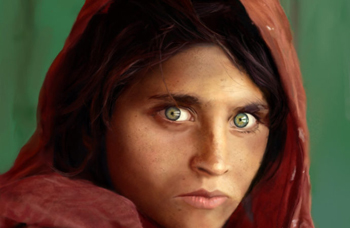Peshawar, Oct 26: Sharbat Gula, the famed green-eyed 'Afghan girl' who was immortalised in 1985 when the National Geographic magazine published her haunting picture on its cover, was arrested here today for staying in Pakistan with fake identity documents.
 Confirming her arrest, the Federal Investigation Agency (FIA) authorities said Sharbat, now in her 40s, was arrested from the Nothia area for illegally possessing a Pakistani ID card.
Confirming her arrest, the Federal Investigation Agency (FIA) authorities said Sharbat, now in her 40s, was arrested from the Nothia area for illegally possessing a Pakistani ID card.
Dubbed as 'Mona Lisa of Afghan war', Sharbat catapulted into global prominence after National Geographic photographer Steve McCurry captured her iconic photograph when she was a 12-year-old girl at the Nisar Bagh refugee camp on the edge of Peshawar in 1984.
She had migrated to Pakistan after situation in Afghanistan became worse and married to a Pakistani man.
Sharbat was arrested for fraud from her home following a two-year-long investigation.
She has been charged under Section 419, 420 of the Pakistan Penal Code and Section 5(2) of Prohibition of Corruption Act.
She was earlier investigated by the law enforcers who discovered that she was living in Pakistan with fraudulent identity documents.
She had also obtained fake identity cards for her two children.
Sharbat, who applied for a Pakistani identity card in Peshawar in April 2014, had used the name Sharbat Bibi.
She was one among thousands of Afghan refugees who managed to dodge Pakistan's computerised system to get an identity card.
The FIA authorities are also conducting raids to arrest her husband and two children.
Earlier, three National Database and Registration Authority (NADRA) officials, including a Deputy Assistant Director and processing officers, were suspended for allegedly issuing her the ID card illegally.
Pakistan has been tackling the Afghan refugee crisis for over three decades; the UNHCR has termed it as the "largest protracted refugee situation globally."
According to UNHCR figures, Pakistan is home to some 3 million Afghan refugees, half of whom are unregistered, making it the third-largest refugee hosting nation in the world.






Comments
Add new comment